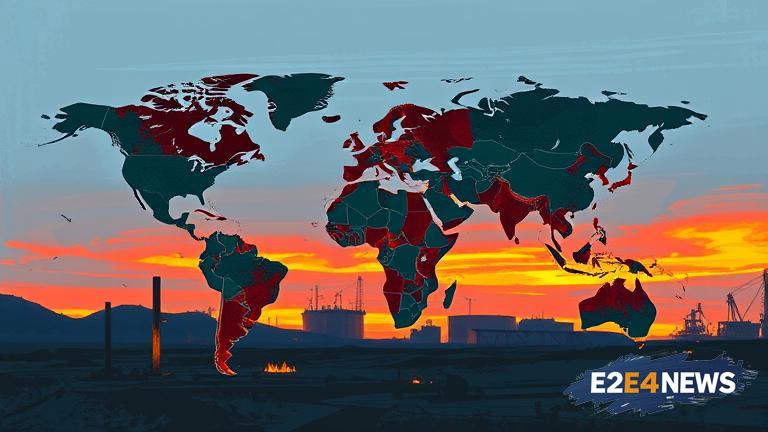The global oil market has witnessed a significant surge in crude oil prices, driven primarily by the looming threat of US sanctions on Russia. This development has sent shockwaves throughout the energy sector, as investors and analysts alike attempt to gauge the potential impact on global supply chains. The US government’s consideration of imposing sanctions on Russia has raised concerns about the potential disruption to oil exports from the world’s second-largest oil producer. As a result, crude oil prices have risen, with Brent crude reaching its highest level in recent months. The price increase has been further exacerbated by the ongoing tensions between the US and Russia, which have led to a decline in investor confidence. The potential sanctions have also sparked fears of a global economic downturn, as trade relationships between major economies become increasingly strained. The oil market is particularly vulnerable to geopolitical tensions, and the current situation has highlighted the delicate balance of global energy supplies. Russia’s oil exports play a crucial role in meeting global demand, and any disruption to these supplies could have far-reaching consequences. The US sanctions would not only affect Russia but also have a ripple effect on other major oil-producing countries. The Organization of the Petroleum Exporting Countries (OPEC) has been monitoring the situation closely, as any significant disruption to global oil supplies could impact the group’s efforts to stabilize the market. The rise in crude oil prices has also had a significant impact on the global economy, with many countries relying heavily on oil imports to meet their energy needs. The increase in oil prices has led to higher production costs for industries such as manufacturing and transportation, which could ultimately be passed on to consumers. The situation has also sparked concerns about the potential for inflation, as higher oil prices could lead to increased costs for goods and services. In response to the rising oil prices, many countries have begun to explore alternative energy sources, such as renewable energy and natural gas. The shift towards cleaner energy sources could have significant implications for the global energy landscape, as countries seek to reduce their reliance on fossil fuels. However, the transition to alternative energy sources will likely be a long-term process, and the global economy will continue to rely on oil for the foreseeable future. The US sanctions on Russia have also raised questions about the effectiveness of using economic sanctions as a tool of foreign policy. While sanctions can be an effective way to exert pressure on a country, they can also have unintended consequences, such as disrupting global supply chains and harming innocent parties. The situation highlights the complex and interconnected nature of the global economy, where events in one part of the world can have far-reaching consequences. As the situation continues to unfold, investors and analysts will be closely monitoring the developments, seeking to understand the potential implications for the global oil market and the broader economy. The rise in crude oil prices has also had a significant impact on the stock market, with many energy-related stocks experiencing a surge in value. The situation has also sparked concerns about the potential for a global recession, as the rise in oil prices could lead to higher production costs and reduced consumer spending. In conclusion, the global oil market is facing a significant challenge, as the looming threat of US sanctions on Russia has led to a surge in crude oil prices. The situation has highlighted the delicate balance of global energy supplies and the potential for geopolitical tensions to disrupt the market. As the situation continues to unfold, it is likely that the global oil market will remain volatile, with investors and analysts closely monitoring the developments.
